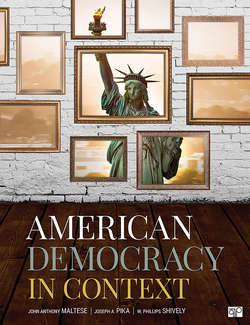Читать книгу American Democracy in Context - Joseph A. Pika - Страница 15
На сайте Литреса книга снята с продажи.
Government and Politics
ОглавлениеWhen the people in a country need to consider changing the way things are done, they engage in politics, the process by which collective decisions—decisions that are binding for everyone in the country—are made for a country.2 Collective decisions include such things as a law, a system of taxes, or a social program. We use process in this definition very broadly to include not only the actions of government officials but also all of the considerations that influence them, such as elections, public opinion, and the media. Politics consists of all the factors that contribute to collective decisions.
politics The process by which decisions that are binding for everyone in the country are made, such as a law, a system of taxes, or a social program.
For example, in 2017, when President Trump called for repealing the Affordable Care Act (aka Obamacare), many voices contributed to that debate and to the political process that followed:
policy schools, which provided scholarly assessments of various sorts of health care delivery systems
the AARP (formerly the American Association of Retired Persons) and labor unions, which ran advertisements opposing the repeal
insurance groups and business organizations that lobbied for or against the repeal
the cable news channel MSNBC, which provided anti-repeal press coverage, and Fox News, another cable channel, which offered pro-repeal coverage
opponents of repeal, who conducted raucous protests at town hall meetings held by members of Congress
ordinary citizens, who talked to one another about the merits of the proposals
parents who brought disabled children to Washington to ask Congress to keep their health benefits intact
members of Congress who engaged in arm-twisting, deals, and bargaining as they attempted to craft and pass, or persuade colleagues to vote for or against, the legislation
All of these voices were part of the politics associated with the decisions about whether, and how, to reform the U.S. health care system.
Republicans’ attempts to repeal and replace the Affordable Care Act led to vigorous protest, including by disabled Americans, some of whom staged sit-ins at congressional office buildings.
Tom Williams / Getty Images
To facilitate the decision-making process, regardless of who participates (or is allowed to participate), every country has a government. A government helps a country to maintain internal order, to interact with other countries, and to develop laws and policies. What sets government apart from any other group is that only the government has the right to make decisions that are binding on everyone within the nation’s borders and that the government has the right to use force (the threat of fines or jail) to ensure that the laws are followed and to implement its decisions.3 Other groups can make more limited decisions, but they are prohibited from using force to implement them. A corporation such as Microsoft, for instance, can decide to design the Windows operating system for personal computers in a particular way, but that decision is binding only on those who voluntarily buy its product. Furthermore, Microsoft cannot use force to implement its decision. By contrast, the government of the United States can pass a law outlawing child pornography for everyone in the country and can use force to make sure everyone follows it.
government The set of people who make decisions that are binding for all people in the country and have the right to use force and coercion to implement their choices.
citizens Members of a country’s population who are legally recognized as subjects or nationals of the country.
Every person living in a country, then, is required to obey its laws—citizens and noncitizens alike. Citizens are people who are fully qualified and legally recognized as members of a country. However, not everyone living in a country at a given time is considered a citizen. Citizens of other countries who are visiting briefly or who have obtained permission to work or pursue their education in the country for a long or even indefinite period of time are not citizens. Also, several million undocumented immigrants live and work in the United States. But whether they are citizens or not, all who reside within a country’s borders are both protected by the country’s laws and required to obey them.
Naturalization ceremonies, in which noncitizens take an oath of allegiance to the United States and formally become American citizens, are held periodically around the country, usually in nondescript government offices but occasionally at special venues such as the Turner Field baseball stadium in Atlanta.
AP Photo / David Goldman
Various types of governments exist, and political scientists distinguish between them according to the basis of their power—in other words, where they get their right to rule. Many countries throughout the world have some form of nondemocratic government, in which a small group of people govern and the rest of the citizens of the country have no direct voice in what the government does. Important types of non-democracy include government by army officers (Thailand, for instance), government by a hereditary monarch (Saudi Arabia), government by a single party that allows no other parties to operate (Singapore), and government by religious leaders (Iran). In this chapter, however, we will focus on democratic government because that is the form of government in the United States.
